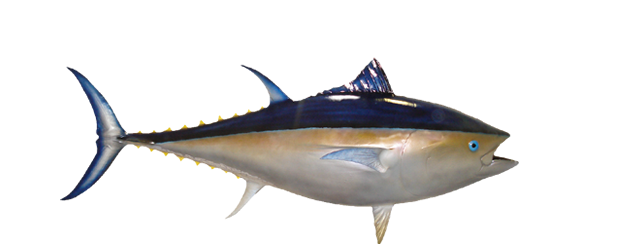Tuna, Bluefin

View Regulations

Scientific Name
Thunnus thynnus


Common Names
Giant tuna, Horse makerel, Atlantic bluefin tuna, Northern bluefin tuna, Tunny fish


Description
Bluefin tuna have a football shaped body and can be distinguished from other tuna by their significantly shorter pectoral fins. Bluefin range in coloration from blue to blue black on their backs, blending half way down the fish to a sliver white belly. The fins of this fish are often yellowish with black edging or a darker coloration containing some yellow.


Habitat & Behaviour
Bluefin Tuna are a school fish and can be found primarily in the sub-tropical or temperate waters of the Atlantic and Pacific Ocean and Mediterranean and Black Seas.


Natural Prey
Bluefin Tuna feeds primarily on fish that reside in mid-depth waters (mackerel, herring, mullet, etc.) as well as crustaceans, cephalopods and eels.


Handling Tips
Grab by tail when get close to boat, tail snares can be useful if the fish is larger which can definitely be the case with bluefin. Can be very strong and gill plates can be very sharp. They have rows of teeth so do not put your finger in its mouth (teeth not especially sharp but still wouldn't be good to get bitten!). Gaff larger ones in back of head if harvesting. Ice right away, make cut in tail to bleed them. Warm blooded fish – melt ice quick so you need to bleed them. Flesh is desirable – so keep water and ice away from the flesh. See the How to Fillet a Tuna video for more details in the Essentials section of the app.

- Lucky Tackle Box
- Billfish Bounty in the Heart of the Mayan World – Guatemala
- The Best Species of Shark to Catch
- How to Catch a Shark: what equipment do you need?
- The Best Winter Fishing Spots in Texas






